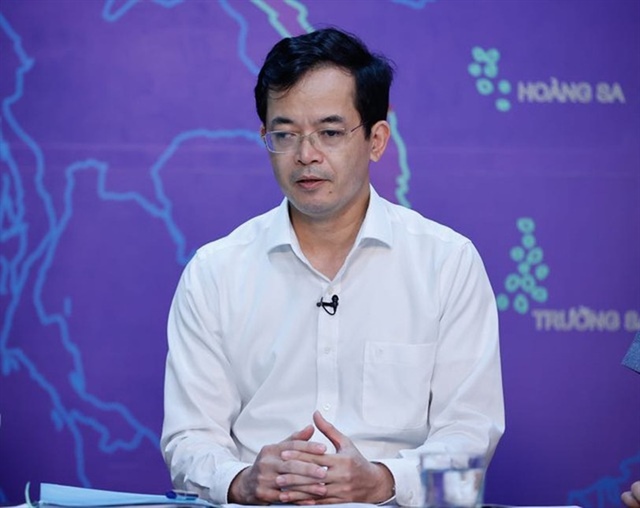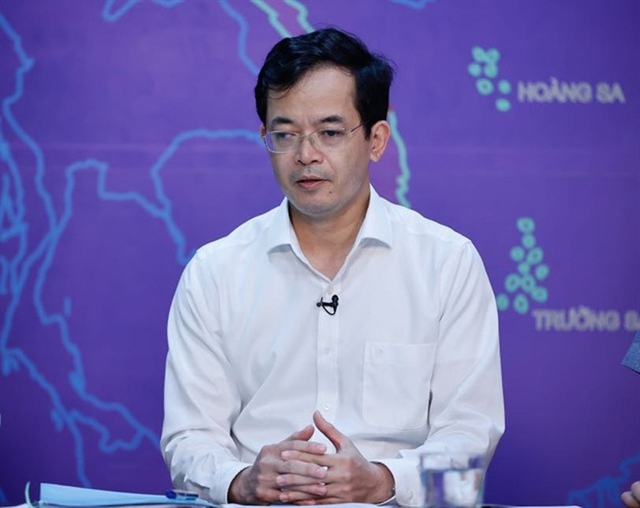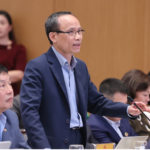
Mr. Truong Ba Tuan, Deputy Director of the Department of Tax, Fee and Charge Policies (Ministry of Finance) – Photo: VGP |
Synchronously reforming tax laws to ensure sustainable revenue and development
Regarding the implementation of the requirements in Resolution 68-NQ/TW on reviewing and perfecting tax policies, Mr. Truong Ba Tuan, Deputy Director of the Department of Tax, Fee, and Charge Policies (Ministry of Finance), said that the reform is being deeply and widely implemented, closely following the 10-year Socio-Economic Development Strategy (2021-2030), the 5-year Development Plan (2021-2025), and especially the Strategy for Tax System Reform by 2030.
Following the guidelines and orientations of the Party, State, and the published economic strategies, the Ministry of Finance has proactively studied, reviewed, and comprehensively assessed all tax laws in Vietnam’s tax legal system. The review aims to ensure comprehensiveness and synchronization, in line with the spirit of the Tax System Reform Strategy by 2030 and the socio-economic development requirements in the next phase.
So far, the Ministry of Finance has submitted or had the National Assembly pass a series of important tax laws. Specifically, these include: The Value-Added Tax Law (passed in November 2024); The Special Consumption Tax Law and The Enterprise Income Tax Law (submitted and expected to be passed in May 2025); Amendments to the Law on Export and Import Taxes within the framework of the multi-sectoral law (expected to be passed in May 2025); and The replacement Personal Income Tax Law (submitted to the National Assembly’s 2025 Law Building Program).
Through this, the Ministry of Finance has affirmed its clear direction in building modern and effective tax policies, contributing to the reasonable mobilization of resources and ensuring accurate and sufficient collection for the state budget. At the same time, it actively supports social security, poverty reduction, and the development of the private sector.
Notably, tax policy reform is being synchronously implemented in multiple aspects. First of all, the tax base is reasonably expanded. The Ministry of Finance reviews taxable and non-taxable income, goods, and services. At the same time, it expands the subjects of the Special Consumption Tax, such as imposing taxes on sugary drinks that exceed the threshold, while narrowing the group of goods subject to the preferential VAT rate of 5%.
“A key requirement is to ensure the principle of fairness and non-discrimination between economic sectors, including foreign-invested enterprises and domestic enterprises. Tax policies will be adjusted to promote the private sector as an essential driver of the economy,” said Mr. Truong Ba Tuan.
Along with that, the representative of the Ministry of Finance said that supporting small and micro enterprises is a priority by reducing the corporate income tax rate to 15-17% (instead of the current 20%). In addition, there are tax exemption policies for certain types of income, such as the first-time transfer of green bonds and emission credits, income from providing basic and essential public services, etc. These measures both promote innovation and digital transformation and support green and sustainable development.
Moreover, tax policies aim to adjust income reasonably, contributing to social equity. The Ministry of Finance also focuses on reviewing existing tax incentives to ensure that they are appropriate, outstanding, and not abused. On the one hand, this encourages investment and job creation, and on the other hand, it controls the consumption of products harmful to health and the environment.
“The reform of administrative procedures to facilitate taxpayers is identified as a focus of this process. Thus, the tax system will ensure both collection efficiency and economic development support,” emphasized Mr. Truong Ba Tuan.
Implementing Resolution 68 and shaping tax reform thinking until 2030
On May 4, 2025, the Politburo issued Resolution No. 68-NQ/TW on private economic development, emphasizing the requirement to perfect tax policies. Immediately after that, the Ministry of Finance proactively built and submitted to the Government to submit to the National Assembly Resolution 198/2025/QH15 – a breakthrough with many specific mechanisms and policies.
Notably, Mr. Truong Ba Tuan said that some new tax policies are proposed for the first time in Vietnam. This reflects a novel approach to creating an effective legal corridor to encourage the robust development of private enterprises.
Not stopping at amending individual taxes, the Ministry of Finance aims to build a comprehensive tax system covering all revenue sources. The focus is on increasing the proportion of domestic revenue, balancing indirect and direct taxes, and promoting the effectiveness of property, resource, and environmental taxes. On the other hand, tax policies must ensure neutrality and avoid incorporating social policies into taxes to prevent market distortions.
In the roadmap from now until 2030, the finance industry will continue to review the entire tax legal system, eliminating inconsistencies and bottlenecks and updating new trends such as the digital economy, the sharing economy, and financial technology. Thus, tax reform not only closely follows reality but also foresees trends, maintaining the country’s right to tax in line with international practices.
Concurrently, building a modern, effective, stable, and predictable tax policy system is a goal that the Ministry of Finance consistently pursues. This mechanism will reassure investors, businesses, and people, contributing to a healthy and transparent business environment.
“Tax policies will not only be a tool for state budget collection but also a crucial lever for economic development, supporting the transformation of the growth model, driving science and technology, promoting innovation, and deep international integration,” emphasized Mr. Truong Ba Tuan.
– 15:42 05/31/2025
“Breaking: Exposé on Saigon Jewelry Company’s Misdeeds”
The State Bank Inspectorate has concluded that Saigon Jewelry Company Limited (SJC) violated regulations related to invoices, accounting documents, and tax, with signs of criminal offenses. At SJC, the buying and selling prices of gold were solely decided and directed by the general director. The State Bank has handed over the company’s violation dossier to the police for further investigation and handling.





















